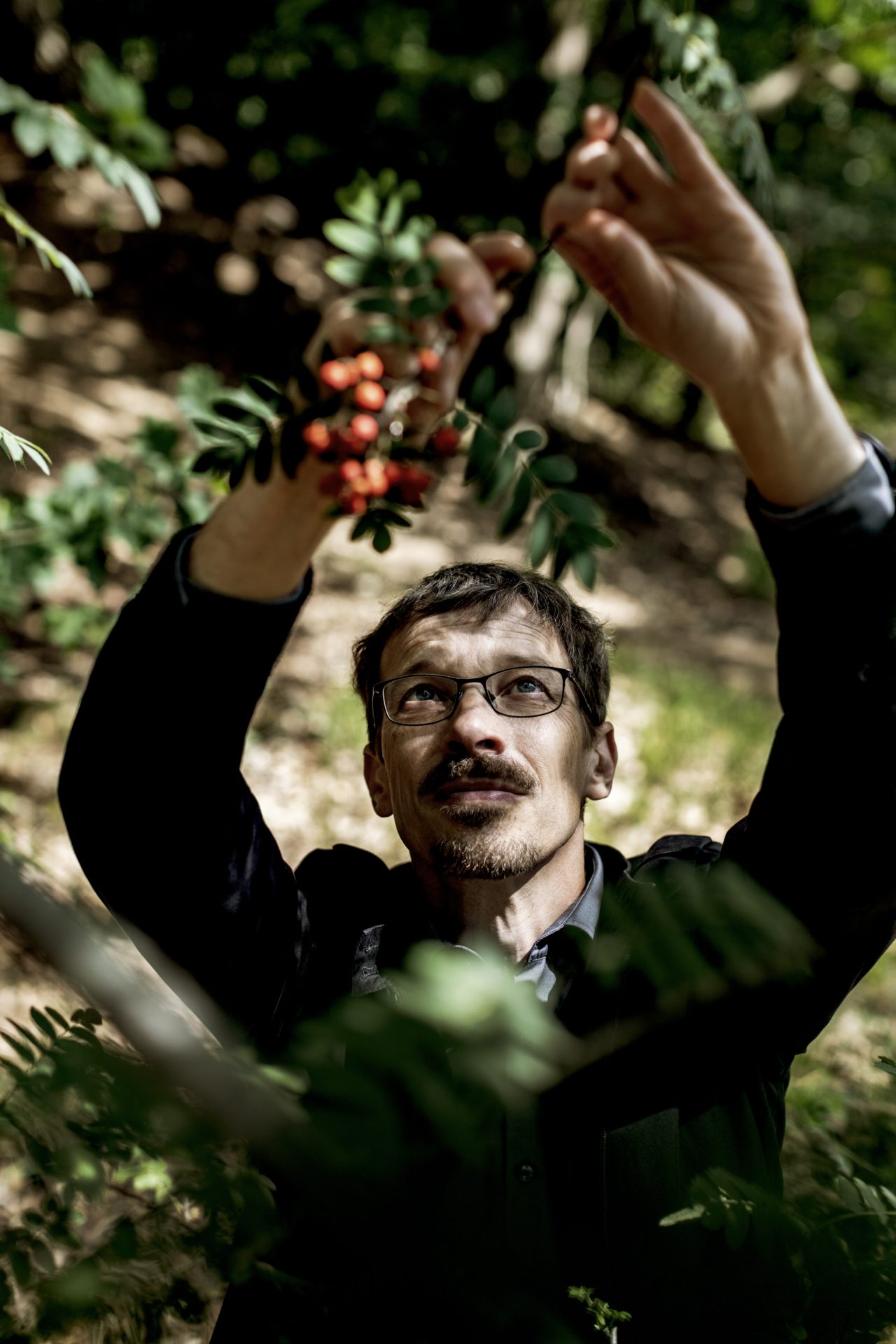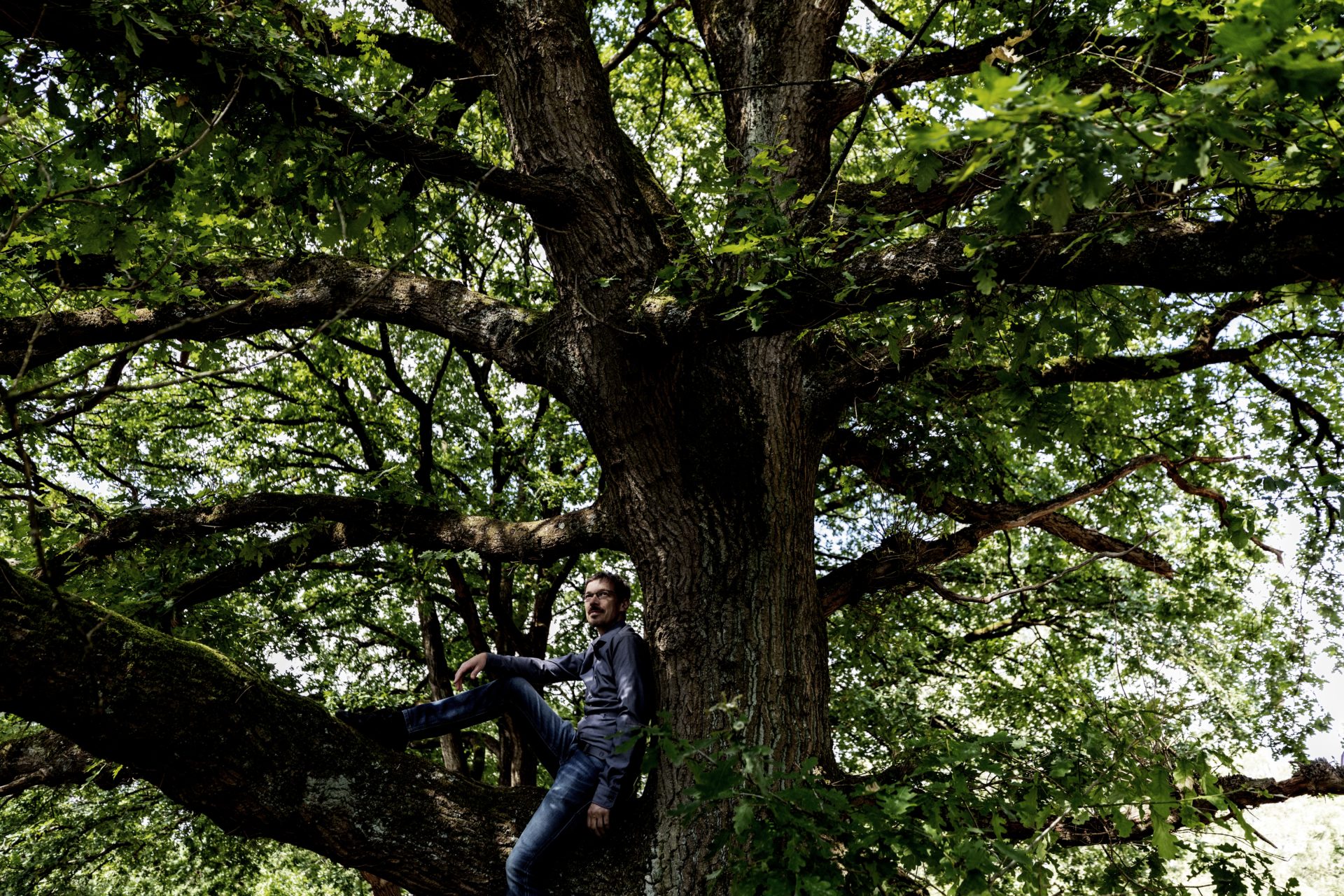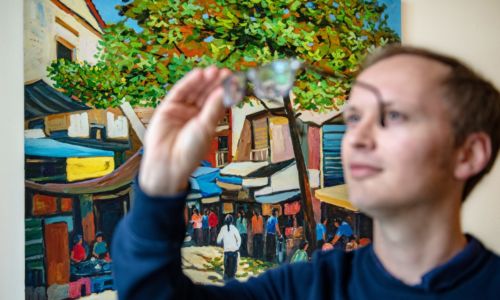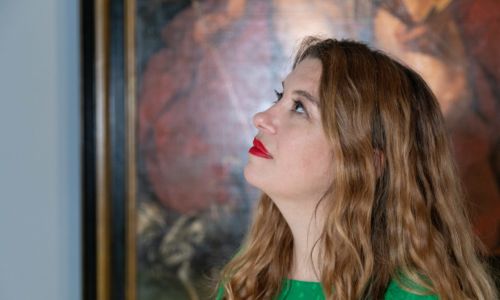Summer interview (7): lecturer Sándor Chardonnens would like to summon demons with his students
-
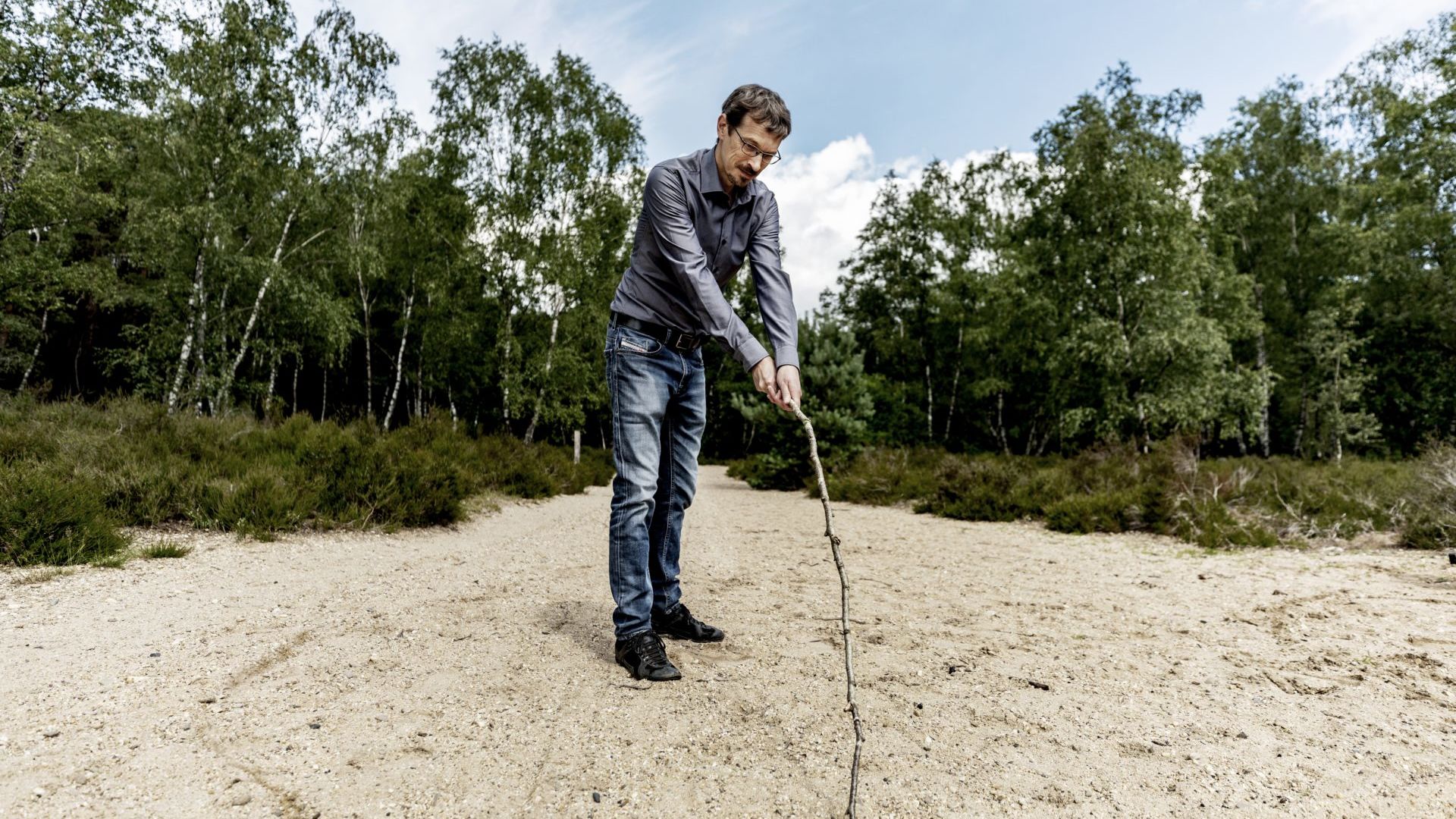 Sandór Chardonnens. Foto: Duncan de Fey
Sandór Chardonnens. Foto: Duncan de Fey
Last year, László Sándor Chardonnens came up with something new for his students: he had them perform a magic ritual. Ideally, the university lecturer would have had everyone summon a demon, but there were too many ethical objections. Chardonnens is a specialist in Medieval magic and calls himself a Catholic Satanist. But what does he believe?
László Sándor Chardonnens (47) is wandering through Heumensoord, a pair of pruning shears in his backpack. It’s January, and there are still no leaves on the trees. He’s on the lookout for one-year-old branches of a hazel tree with which he can perform a magic ritual. Why one-year-old hazels in particular? ‘That’s what it says in the scriptures.’
Now and then a big drop falls from the trees. It has rained this morning. Chardonnens looks through the bushes, from which a mist is rising. He describes what he sees: ‘This is an elder tree.’ In his day job, this naturalist is a university lecturer in English Language and Culture. Originally he was a philologist, researching the older stages of language. His current specialisation? Deciphering handwritten magic books from the sixteenth century. Chardonnens knows everything there is to know about incantations, the summoning of spirits, and magic rituals.
Treasure hunt
He will soon perform a ritual from one of these books of magic together with his students. They’re going to dig for treasure. ‘I’d prefer to summon a demon with them first. To do this, you have to stand in a circle with several people and let a spirit emerge by using incantations. Then you can start asking the spirit questions. But I’m skipping this part for safety’s sake.’
There are too many objections to summoning a ghost, he says. What if a student goes into psychosis after the ritual and tells their parents they were performing a magic ritual with their teacher? A complaint won’t be long in coming. And then there’s the question: who is to blame? Chardonnens? The university? The lecturer also thinks it’s tricky from an ethical perspective. What if the magic ritual from the Middle Ages works and a malicious spirit manifests itself instead of the good guy you were trying to summon? ‘I can’t predict what would happen.’ He laughs. His footsteps sound like whispers on the wet foliage.
‘They’re afraid a ghost will actually show up’
It is precisely these ethical aspects of magic and rituals – and all of life really – that the researcher likes to philosophise about. As a teacher, he has to think carefully about what he exposes his students to. So he’s made the magic ritual a little more benign. The one-year-old hazel trees he is looking for at Heumensoord are meant to help him find a treasure. The only thing that students have to do is put the sticks in the ground near the Berchmanianum monastery. They attach a note to each branch with one of God’s secret names written on it. ‘According to the manuals, you first summon a ghost to ask where the treasure is. The sticks then act as a GPS to give you further indications of where you should look. We are omitting the ghost and are going straight to the sticks. If, after a few days, one of the notes is burned, damaged or missing, that’s where you have to start digging.’
Scary
Sándor Chardonnens chats as if a treasure hunt on the university campus is completely common practice. And in a way, for him it is. He has been immersing himself professionally in the world of medieval sorcery for years. And he’d be the last one to write off the manuals as nonsense.
Only a handful of researchers around the world are involved in magic potions, rituals and demons from five hundred years ago. They meet at international conferences now and then. Chardonnens is currently deciphering a handwritten book of magic from around 1580. He regularly visits the British Library in London, where the historical collection of writings is located.
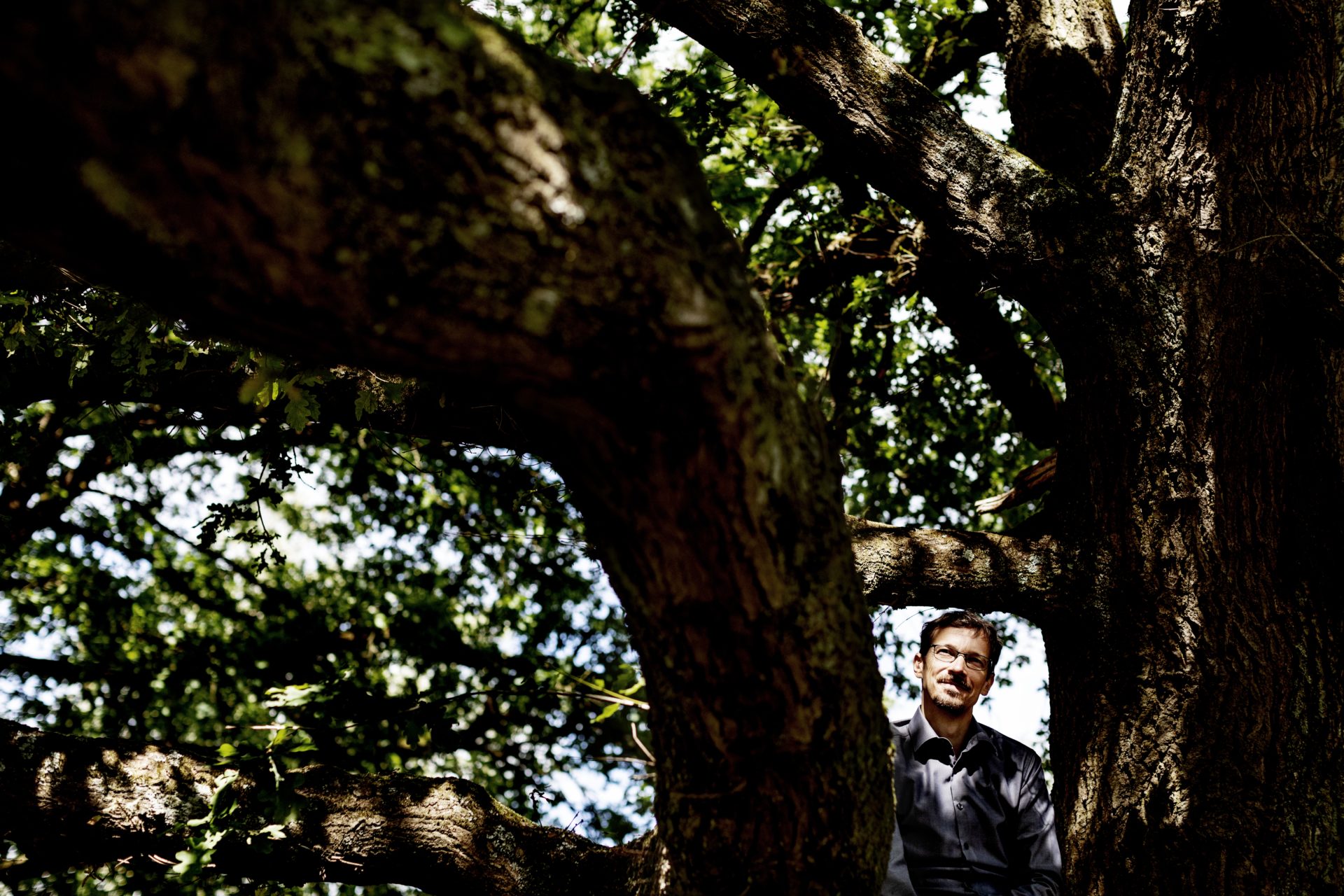
The course on demonic magic that he teaches at Radboud University is an elective within English historical literature. Fifty students of Philosophy, Religious Studies, and (Liberal) Arts signed up for it this winter. They learn to decipher a number of pages of the magic book and get background information on the worldview of that time. Lectures on incantations, magic circles and the cosmology of the supernatural help them understand the contents of the book of magic. According to Chardonnens, his profession is popular because students have a Harry Potter-ish image of magic. However, peace on earth, saving humanity and the cosmic battle between good and evil play no role in ritual magic.
At the start of the course, which he taught last year as well, he always asks his students whether they believe in anything. Usually, the answer is no, or they say that at most there’s just ‘something’ out there. It is rare that anyone in his course proclaims they are a practising Christian or that they profess another religion. ‘The funny thing is that when I later on in the course ask them to decipher and read out the formula for an incantation, or to design one themselves, some of them don’t dare to do it. And certainly not out loud. They’re afraid a ghost will actually show up. I tell them that it is about a Christian demon, and ask, “But you weren’t Christian, right?” No, they answer, “But I’m still afraid.” That means a lot of young people do have the whole business on their minds. On the one hand, you have the exaggerated image of secularisation that makes people think they have lost that entire spiritual dimension. On the other hand, the series on Netflix about supernatural beings communicating with people are immensely popular. That paradox between the rational “I don’t believe in anything” and the fear involved in “but let’s just suppose….” That fascinates me.’
He likes to hold up a mirror to his students. Saying you don’t believe in anything doesn’t mean you don’t believe in anything. Students walk around the university because they want to increase their chances of a good job and a successful future, also a kind of faith. Magic used to be practised for the same purpose, but it went a step further: wizards tried to actively influence the course of their lives by seeking contact with supernatural beings or by exploiting occult – hidden – properties of nature.
Meaning
The pruning shears are still in his backpack. Chardonnens points to one shrub after another, but no hazel tree turns up at Heumensoord. In a clearing, he sticks his nose in the air. ‘A fox. Do you smell that?’
His first names, László Sándor, may sound Transylvanian, but Chardonnens comes from Rozenburg, an island just south of Maassluis in South-Holland. He was named after friends of his parents who had fled from Hungary. His love for magic was born when he earned his doctoral degree in Leiden. Or actually, he thinks, maybe the passion goes back further than that. What child isn’t fascinated by wizards and witches? He wonders aloud. As a teenager, he was already making amulets out of different metals. Chardonnens was raised Catholic, did his confirmation and, for a while, was a member of a Pentecostal congregation. ‘I was baptised in one of those pools and all that, but then I got away from that again.’ He studied biology in Leiden for a short while, and then one fine day he switched to English just like that. Medieval English appealed to him, and he went on to pursue his doctoral degree. ‘There was another subject my supervisor hadn’t got around to: predicting the future in early Medieval England. That’s what I obtained my PhD in. Later, I did a postdoc on precognitive dreams in the late Middle Ages. ‘And that’s how my academic love of magic grew little by little.’
Because of a Medieval magic seal that one of his students found in Doornenburg Castle – Chardonnens went in search of its origins – he came upon handwritten books of magic while in England. ‘People always think that a wizard used to work like some Faust character in his attic or a cellar, but in reality, they were, and still are, active in large social networks. There was a broad, intercultural transfer of knowledge. You can find the same kinds of texts in all European cultures, and then they were taken across the world to North and South America. Magic was a form of meaning. What was in store for people? Love? Illness? Death? They wanted to get a handle on that, and we are no different today. The notion that we want to know the future is present in all cultures.’
Chardonnens continues his history lesson: magic books used to be written in Europe by monks and were passed around in monasteries. Because clergymen were also active in magic rituals, spells and incantations contain religious elements, including prayers and biblical quotes. Paradoxically, only a good Christian could, as a wizard, get God’s power to restrain a spirit, which could then, for example, kill a neighbour, or make a harvest fail. All very biblical.
The slender lecturer starts talking faster when he says that the sixteenth century was an exciting time. ‘On the one hand, you had the beginning of the Renaissance, during which many social developments became detached from the doctrine of the Church. And a lot changed at the religious level as well. In England and Germany, the Reformations were in progress, and this required a recalibration of the knowledge of magic. Protestants such as Luther laid magic at the doorstep of the Catholics, who were always doing it, and they wanted nothing to do with it. The word hocus pocus comes from ‘hoc est (enim) corpus (meum)’, which is what the priest intones when he holds the sacrament high, referring to the body of Christ. At the same time, Catholics wanted to distance themselves from magic, and members of the clergy were no longer permitted to write books of magic. The users of those texts fell into disfavour, and ritual magic shifted from the clergy to secular society.’
That’s how ritual magic got a bad name over the centuries. And wrongly, Chardonnens believes. Why should you believe in the resurrection of Christ and pray to an invisible God, but not summon spirits, the creatures of that same God? Magic was associated with the devil, but the lecturer calls that a ‘construct’, an opposition conceived by humans. ‘After all, the difference between religion and magic essentially comes down to who is allowed to perform which rituals. When Jesus brings a dead man back to life, it’s a miracle. When a wizard does the same thing, it’s the work of the devil. Surely that kind of logic defies understanding.’
‘I would rather seek my salvation with Satan as a saviour’
This is where he has to watch his words, says Chardonnens when he stops for a moment at a small pond in the woods, because he made a few students angry in last year’s course. In the evaluation, they – devoted Christians – called their teacher a Satanist who misused the word of God.
And you’re not a Satanist?
‘Well, yes, in fact, they were right. I am a Satanist. In the sense that I’m having trouble with the Christian Trinity. I’m struggling with the idea of justice I used to learn from the nuns at school. If you lived well, you’d be rewarded for that. But there is an enormous amount of suffering in the world, which incidentally is very unevenly distributed. How is that just? I have little sympathy for the notion of penance and punishment and for a God who would only reward people after death. Here on earth, that works in strange ways. I also have trouble with the fact that God locked people up in a kind of paradise, put a tree there with the knowledge of good and evil, and then said: “Don’t touch.” Since He is omniscient, God already knew what would happen, and yet He punished those who wanted to eat from the tree. I think that’s sadistic. If another creature, then – according to tradition, that’s Satan – comes along and frees you from that garden of paradise by helping you acquire knowledge, I find that an attractive idea. I would rather seek my salvation with Satan as a saviour who rewards people with knowledge than with a creator who tries to keep people stupid through harassment and intimidation. Some Christians find that shocking. What I find shocking is that God had a child to fight on earth with our saviour.’
You dare say things like that out loud in a course.
‘Yes, I do. I say things like that to get students thinking. Education is also about exploring ideas and possibilities.’
Is that allowed at a Catholic university?
‘I’ve never been called out on it. A university is an environment in which critical and, above all, systematic thinking is practised, and my teaching provides ample opportunity for this, partly based on ongoing scholarly research. I do, of course, think about how my convictions fit in with the religious vision of the university, but the fact that I am a Catholic Satanist makes it quite pleasant to work in a Catholic institution. While most of my colleagues are eager to eat the sacrament of the Eucharist after confession, I naturally avoid any contact with the body of Christ.’
He is often asked what he believes about the things he studies and teaches. He is unable to give an unambiguous answer. ‘In any case, no dead crows hanging at the front door of my house, but there is a statue of the Blessed Virgin. I do not actively seek out the world of the supernatural. I see the natural and supernatural rather as filtering my perception, similar to layered maps in Google Maps. Sometimes I come across surprising things, such as a toad with only one eye, sitting in a corner of a dolmen in Denmark, followed by a one-eyed cat at the same dolmen a few years later. Was that Wodan? I do use a lot of protective magic, and when I was decorating the children’s rooms, I applied magic symbols to doors and windows under the stucco layer.’
While the effects of religion and magic may not be scientifically demonstrable, what Chardonnens finds important is that these things can make life a little more pleasant.
‘No dead crows hanging at the front door of my house’
Chardonnens is not one of those academics who places pure science above faith. ‘The idea that there is a kind of evolution from magic to religion to science took shape mainly in the nineteenth century. And we’ve gone along with that ever since. We’ve made it our master narrative. This is reflected in the distribution of subsidies among the various departments, but also in the social appreciation of the study programmes people choose. Young people are being pushed in the direction of technical education, and the humanities are increasingly being driven into a corner where appreciation from the knowledge economy is not immediately perceptible. And all of this even though alumni of humanities courses contribute quite a lot to society. Nowadays, we pretend that all the important scientists were so-called pure scientists, but that picture just isn’t correct. Isaac Newton was an alchemist, Johannes Kepler was an astrologer, and Marie Curie went to sessions run by spiritualists. The English philosopher Francis Bacon is regarded as the founder of modern science, but he was also a wizard!’
Chardonnens just wants to say: It’s useful to look at the past to put our thinking into perspective. That’s what he likes to impart to his students. And now he has fished a banana, not the pruning shears, out of his backpack. Apparently hazel trees do not grow at Heumensoord. He gives up and takes a bite of his fruit.
Corona
The next time we meet, it’s summer. The corona crisis has brought time to a standstill. The magic ritual that Chardonnens had been preparing for never took place – at least not in the form he’d had in mind. ‘My idea was for us all to watch an exciting film such as The Exorcist together at the end of a lecture,’ he says, ‘and to eat together after that in the Refter, before going to look for the treasure around the Berchmanianum.’ He adds, in a conspiratorial tone: ‘Preferably in the dark during a new moon.’
Instead, he had no choice but to convert his course into an online format. To his surprise, his students kept ‘showing up’ every Wednesday afternoon. At the end of the series of lectures, he assigned his students the task of putting branches in their back yards or the woods with different names of God on them. ‘It was a voluntary assignment. Only a few students performed the ritual.’
Is he disappointed? Not really, he says. What was remarkable, was that many students gave as a reason that they found it scary to undertake the ritual themselves. And this brings us back to where we started: students who said they were faithless, were afraid that they might inadvertently summon a ghost. ‘I am interested in the disconnect between what you say rationally, namely that there’s no supernatural world, and the feeling that you experience when you have to carry out an activity that may make contact with that world, which could now all of a sudden exist after all.
In recent months he has noticed how often in times of uncertainty – corona – reference has been made to something supernatural. Not just in the sense of ’the earth is trying to warn us’ and all sorts of conspiracy theories, but also looking at the use of language. ‘Politicians and researchers talked about staring into a crystal ball as a metaphor for the uncertain course of the pandemic. Trump said he was hoping for a miracle cure. When do you ever hear heads of government use terms such as miracle these days?’
The university lecturer worked a lot in his vegetable garden during the corona crisis (‘I also found hazel trees, by the way. And do you know where? On the Duivelsberg – Devil’s Hill!’). He also looked after his two young kids at home. His son had nightmares, and each time he would say he’d seen a dark figure by his bedside. The solution Chardonnens came up with? ‘We performed a ritual together, captured the ghost in a bottle, and then quickly put the cap on.’
Aha – so Chardonnens is a real believer? He laughs: ‘You’re asking how I’m sure the ghost was in the bottle. Well, let me ask a different question: Did it do the trick? For my son, it was enough to get the apparition out of his room and let him have a good night’s sleep again.’
